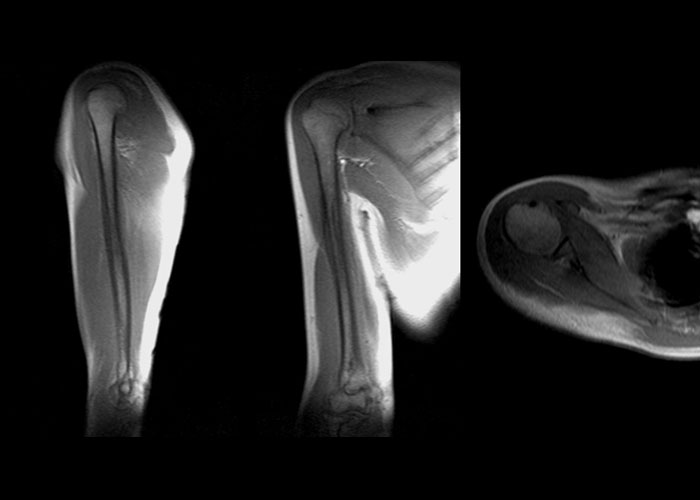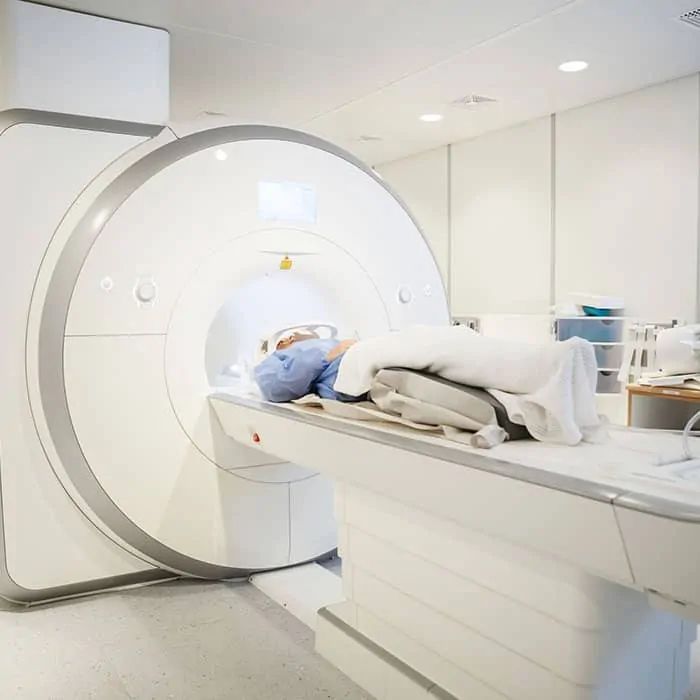Soft tissue (thigh, upper arm) MRI examination
With the help of the extremity soft tissue MRI, the connective tissues, muscles, and tendons of the upper arm or thigh, and the blood vessels surrounding them become visible.
MRI is an imaging diagnostic procedure that uses magnetic field to take detailed images of the human body.
The magnetic field generated by the device converts the energy changes in the body into a high-resolution, three-dimensional image by a high-performance computer.
What types of diseases does the examination help diagnose?

Extremity soft tissue MRI is most often ordered by a traumatologist in the event of an injury, or by a rheumatologist in addition to laboratory tests and ultrasound to determine the exact cause of muscle pain.
The examination helps diagnose the following soft tissue lesions:
- a palpable lump in the soft tissue
- muscle rupture
- haematoma
- bone oedema
- bone tumour, metastasis
- bone necrosis
In case of which symptoms is it recommended to have the examination performed?
The specialist usually orders the examination if the soft tissue lesion is not clearly visible on the ultrasound, or if you want to get a more accurate picture of its extent and location.
The following complaints may indicate a soft tissue injury or lesion, in which case it is recommended to consult a rheumatologist first:
- palpable lump in muscle
- muscle pain (from exhaustion or injury)
- pain along the tendon sheath
- tendon adhesion pain (e.g. tennis elbow)
How to prepare for the examination?
It is recommended to consult a rheumatologist or a traumatologist in case of injury before the MRI examination.

Native scan does not require special preparation. However, it is important to know that due to the strong magnetic field, it is forbidden to bring any metal, device or object containing metal into the examination room! This also applies to implants in the body, as well as to jewellery and piercings.

Medical recommendation is always required for examination with contrast agent. Do not eat for 6 hours beforehand.
The condition for the administration of the contrast agent is the appropriate kidney function value (creatinine and urea). This requires a recent laboratory finding, but it is also possible to perform a rapid creatinine test or eGFR measurement on site, which is done from a fingertip, with the help of the MRI operator.
How is the examination performed?
Extremity soft tissue MRI is performed lying on your back.
The operator will place the required coil and then the examination bed will lift you into the magnetic tube.
It is important that you remain still during certain parts of the scan, you can only change your body position with the permission of the operator. During the examination, you can communicate with our colleagues continuously via the built-in microphone and speaker, or you can interrupt it by pressing the panic button.
The MRI device is noisy, a knocking, clicking machine noise can be heard during the examination, the intensity of which can be reduced by using earplugs.
The test lasts for 25 minutes.
When can the examination not be performed?
The examination cannot be performed if you do not have an MRI compatible metal, implant, prosthesis (pacemaker), orthopaedic metal (screw, plate, nail, wire), implanted joint prosthesis, prosthetic limb, implanted defibrillator, neurostimulator, implanted drug dispenser, vascular implants (e.g. clips, vascular occlusion devices), ear implants, metal foreign body (e.g. bullet, splinter, other electronic implants).
Therefore, in case of an implant, implanted metal, prosthesis, please bring a written certificate of its compatibility with MRI examination (certified by the implanting specialist, institution) for the examination itself, which clearly states: the suitability to enter the MRI examination room, to perform the MRI examination and marking the maximum magnetic field strength (1.5 Tesla, 3 Tesla) for the device or implant. Inform the person performing the examination about the implant beforehand.
In the case of an examination with contrast agent, the scan is not performed with poor kidney function.
In case of pregnancy, the examination cannot be performed in the first trimester.
Due to the fixed diameter of the closed tube, it is not possible to perform the scan above 200 kg or depending on the abdominal circumference.
What can I expect after the examination?
There are no side effects of the extremity soft tissue MRI examination.
The contrast agent used for MRI examinations is gadolinium-based. In rare cases, hypersensitivity might happen, which may occur in the form of an allergic reaction within 20 minutes after the administration of the contrast agent.
When is the result expected?
The completed recording will be reviewed by the radiologist and the result will be available in our online system after 5 working days.
In all cases, consult a rheumatologist or, in the event of an injury, a traumatologist to make a diagnosis and determine the appropriate treatment.

